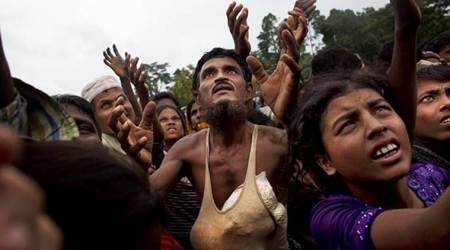 A protest in support of the Rohingya Muslims and calling for the on going violence in Myanmar on the minority Muslims in RR Avenue in Kolkata on Tuesday , September 11, 2017. Express Photo by Partha Paul
A protest in support of the Rohingya Muslims and calling for the on going violence in Myanmar on the minority Muslims in RR Avenue in Kolkata on Tuesday , September 11, 2017. Express Photo by Partha Paul
“I deplore current measures in India to deport Rohingyas at a time of such violence against them in their country… by virtue of customary law, its ratification of the International Covenant on Civil and Political Rights, the obligations of due process and the universal principle of non-refoulement, India cannot carry out collective expulsions, or return people to a place where they risk torture or other serious violations.”
The United Nations High Commissioner for Human Rights could not have said it more bluntly. It was part of his opening statement to the United Nations Human Rights Council’s 36th session earlier this week. Zeid Ra’ad Al Hussein has been regularly calling countries to account at the UN where, in nine cases out of ten, nations unite to thwart meaningful international scrutiny of their records.
It is clear that the entire UN human rights system has got the measure of the Goebbelsian spin that the Indian political and diplomatic leadership has been engaging in, particularly since 2014, on human rights, tolerance, democratic norms and standards. Coincidentally, India’s membership at the UN Human Rights Council ends this year. In his statement, Al Hussein did not confine himself to the utterances of the Narendra Modi government. He also commented on the climate of fear amongst not only the minorities but among large numbers of citizen of India.
“I am also dismayed by a broader rise of intolerance towards religious and other minorities in India. The current wave of violent, and often lethal, mob attacks against people under the pretext of protecting the lives of cows is alarming. People who speak out for fundamental human rights are also threatened. Gauri Lankesh, a journalist who tirelessly addressed the corrosive effect of sectarianism and hatred, was assassinated last week. I have been heartened by the subsequent marches calling for protection of the right to freedom of expression, and by demonstrations in 12 cities to protest the lynchings. Human rights defenders who work for the rights of India’s most vulnerable groups – including those threatened with displacement by infrastructure projects such as the Sardar Sarovar Dam in the Narmada river valley – should be considered allies in building on India’s achievements to create a stronger and more inclusive society. Instead, many are subject to harassment and even criminal proceedings, or denied protection by the State.”
Underlying the UN High Commissioner’s statement is less outrage and more a deep sense of disappointment at India’s stonewalling and obfuscation. India’s attitude to all well-meaning advice and mild criticism has been procrastination, in the forlorn hope, that the concern about India will be overtaken by concerns elsewhere. Yemen, Syria, Myanmar, et al.
One example of this stonewalling is how India deals with important UN communications. During India’s third Universal Periodic Review (UPR) at the UN Human Rights Council on May 4, 2017, in Geneva, the Human Rights Council made many important suggestions in the hope that the country that styles itself as the world’s largest democracy will be responding to recommendations on September 21, 2017, when there is review of India’s obligations.
The recommendations of the UPR pertained to restrictions presently placed against civil society, freedom of association, media freedoms, ratification of the UN Convention Against Torture to name just a few.
New Delhi’s insouciance on human rights or democratic behavioural norms is breathtaking. It is 20 years since it signed the Convention against Torture but has not found the time to ratify it. It has not reported to the UN Human Rights Committee, a requirement under the UN Civil and Political Rights Convention since 1997. The reporting cycle is four years. The number 20 seems to be a favourite with the MEA. India signed the Convention for the Protection of all persons from Enforced Disappearance 10 years ago; it is yet to ratify it by passing a domestic law. Meanwhile, individuals like Jawaharlal Nehru University student Najeeb Ahmed continue to vanish into thin air. For the forlorn half widows in Kashmir, it is time to discard the hope that they will have any information about their ‘disappeared’ husbands.
India last reported to the Committee on the Elimination of all forms of Racial Discrimination 10 years ago. Caste is a millstone around India’s neck and domestically there is a sense of ennui even in liberal circles. The Hindutva brigade knows that when caste goes the Vedic Hindu order will go too. The treatment of Africans in India has shocked world opinion and it will continue to revisit us in all international fora. This is only a representative list, not exhaustive.
Rajnath Singh, clearly the most experienced political hand in the BJP stable, has made some statements in Kashmir that are different from the rhetoric that we have been hearing since 2014. Can we have the banning of the use of pellet guns for starters? The trust of the Kashmiri people is to be earned today.
Here’s more from the UN High Commissioner for Human Rights, one of the strongest and most courageous voices in the UN, and indeed in the international community, today.He has spared no government during his tenure. On Kashmir: “I regret the reluctance of both India and Pakistan to engage with my Office on the human rights concerns I have raised in recent months. This includes their failure to grant access to Kashmir on both sides of the Line of Control to verify the worrying developments that continue to be reported there. In the absence of such access, my Office is undertaking remote monitoring of the human rights situation in Kashmir on both sides of the Line of Control, with a view to making the findings public in the near future.”
The Supreme Court of India follows normal procedure even when it has urgent items on its list. It postponed the hearing on the government’s intention to deport Rohingya refugees, scheduled for September 11, by one week. This means the police will continue to do the rounds of Rohingya homes in Jammu, Jaipur, Mewat, Delhi and Hyderabad, intimidating an already beleaguered community. One week is a long time when your lives and your children’s lives and safety are on the line.
Against the backdrop of such thoughtlessness and the rabid posturing of right-wing elements, it is the Sikh community that has set a wonderful example. A group of Sikh volunteers has arrived at the Bangladesh-Myanmar border to provide much needed relief and more importantly a spirit of solidarity and compassion to a physically and mentally broken people.
Let’s leave aside the hollow invocations – and hypocrisy – of ‘vasudhaiva kutumbakam’.We will only abide by the call to ‘We The People’, in the preamble to our Constitution. It is, and must, continue to be our guiding light, our pole star, not any other Nakshatram.

